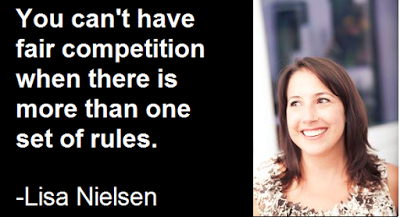Why School Choice Does Not Lead to Fair Competition Or Innovation In Public Schools


With the confirmation of Betsy Devos, people are trying to understand why there is such an outcry against choice. Isn’t competition a good thing? Reporter John Stossel said in a discussion on my Facebook page, “If the parents get to choose, and the money follows the kids, good schools will grow and bad ones will get better.”
But that can’t happen and the game isn’t fair.
Here’s why.
Once No Child Left Behind was enacted, public schools were forced to leave student-centered ideals behind and focus on ensuring children passed one-size-fits-all standardized tests that rewarded memorization and regurgitation. Authentic learning opportunities went to the wayside in public schools. Models like Big Picture Learning and Schoolwide Enrichment that honored students talents, passions, interests and abilities could not survive in such a climate. As a result, only private schools and charter schools are able to embrace models such as the Montessori Method, Agile Learning, Reggio Emilia, and Democratic Schools that allow for the freedoms that can be realized when operating outside the restrictions and regulations imposed upon government schools.
While some of these models were embraced in the past in public education, they can not survive the current climate of standardization and regulation. As a result the competition is rigged. Charters and privates can provide child-centered, innovative learning environments that the government prevents public schools from embracing.
Does it have to be that way?
No.
Tools and ideas to transform education. Sign up below.
We should allow for true competition where public, not just private and charter, schools can get into the same game. Lift the regulation, compliance, and standardization that prevent public schools from doing what they need to do to foster success for all students. The climate might be right for such a move. In Israel, when Yaacov Hecht took full advantage of political shifts and changes, eventually Israel had more Democratic schools per capita than any other country -- and they were funded by the government! This happened when Hasidic schools won the battle to achieve government funding in Israel. Hecht argued that if schools could receive funding based on parent’s religious beliefs, they should also be eligible for funding based on other ideological beliefs of parents. In this comparison Trump/Devos are playing the role of the Hasids in Israel -- they are trying to by funnel money to religious schools via vouchers. In his book Democratic Education: A beginning of a story Hecht shares how he rallied a community to support the establishment of this model of education being funded by the government.
Do we have the same strength of purpose and commitment to better education to do what Hecht did in Israel? What would such an effort look like? Where do we start?
We start by working to end the system where charter and private schools have one set of rules and public schools another. Let’s play fair. If we want true competition, then we’d even the playing field and give public schools the same freedoms enjoyed by their counterparts.
Lisa Nielsen writes for and speaks to audiences across the globe about learning innovatively and is frequently covered by local and national media for her views on “Passion (not data) Driven Learning,” "Thinking Outside the Ban" to harness the power of technology for learning, and using the power of social media to provide a voice to educators and students. Ms. Nielsen has worked for more than a decade in various capacities to support learning in real and innovative ways that will prepare students for success. In addition to her award-winning blog, The Innovative Educator, Ms. Nielsen’s writing is featured in places such as Huffington Post, Tech & Learning, ISTE Connects, ASCD Wholechild, MindShift, Leading & Learning, The Unplugged Mom, and is the author the book Teaching Generation Text.
Disclaimer: The information shared here is strictly that of the author and does not reflect the opinions or endorsement of her employer.
Lisa Nielsen (@InnovativeEdu) has worked as a public-school educator and administrator since 1997. She is a prolific writer best known for her award-winning blog, The Innovative Educator. Nielsen is the author of several books and her writing has been featured in media outlets such as The New York Times, The Wall Street Journal, and Tech & Learning.
Disclaimer: The information shared here is strictly that of the author and does not reflect the opinions or endorsement of her employer.
